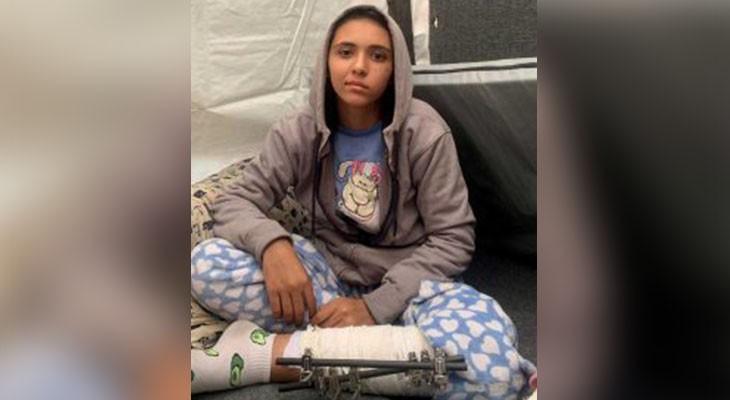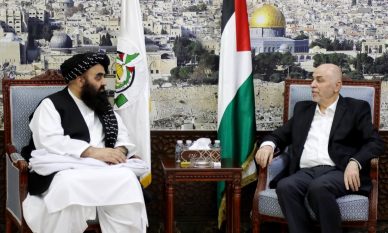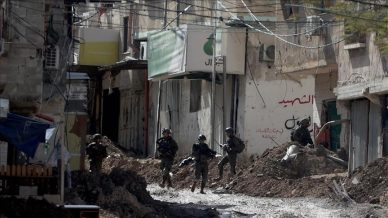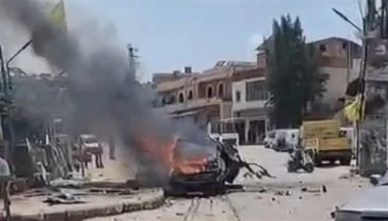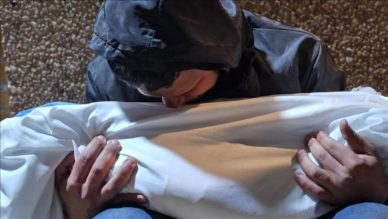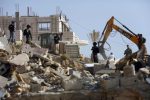GAZA, (PIC)
“All my dreams vanished. My two sisters were martyred, and my house was bombed. The wedding clothes and my gold jewelry all remained under the debris. The Israeli occupation left me with nothing.” With these words, the Palestinian girl Nihal Al-Najjar narrates a part of her ongoing suffering due to the continuous Israeli aggression and crimes in the Gaza Strip.
In a tent among the displaced people in the southern Gaza Strip, Al-Najjar lives and struggles to endure and survive amidst relentless shelling and a difficult humanitarian situation caused by the ongoing Israeli aggression for 117 days, according to Sanad Agency.
War shattered hopes
Nihal, who was studying public relations and marketing, was full of hopes and aspirations academically and personally, as she was preparing for her wedding within a month, including purchasing clothes and gold jewelry. But all of that disappeared and was crushed under the rubble and the weight of an unforgiving war.
With great anger and pain, she says, “The occupation has taken away everything beautiful in my life. We all now live in terrible misery. I cry for my sisters all the time, and I cry because of the situation and the lack of hope.”
The decision to evacuate
Nihal narrates her story about her suffering from the bombing, saying that since the beginning of the war, intense Israeli shelling began everywhere in the city of Gaza, then came the shocking decision to evacuate the residents of Gaza and its north to the south.
She says, “On 12.10.23, we received instructions from the occupying army through phone calls and text messages to evacuate the building we were living in, Tower No. 3 in the Mukhabarat Towers, because they intended to bomb it.”
She explained that the tower consisted of 11 floors, and she lived in one of the four apartments on the third floor with her family – her father and four brothers and sisters, according to her testimony published by B’Tselem, the Israeli Information Center for Human Rights in the Occupied Territories.
She adds bitterly, “I am engaged, and I was supposed to get married in November.”
The family was scattered
She said, “Some of the residents of the building had left as soon as the war started due to the shelling. My mother, my two sisters, and I left on 12/10/23 and went to my aunt Samira Al-Najjar’s house in Jabalia refugee camp. My father and my two brothers stayed at home, but on the same day, Tower No. 1 was bombed, so they moved to the Mashatel Hotel in northwest Gaza City.”
She added, “Due to the shelling in the hotel area, they told us that they would move to the Khan Younis area, where a camp for the displaced was set up improvisationally in the industrial training complex belonging to UNRWA.”
Nihal stayed with her aunt for about two weeks, with constant shelling and glass fragments flying towards them. On 24/10/23, her aunt received a phone message from the occupation army ordering her to evacuate the house because they intend to bomb it.
Second displacement and targeting
She said, “We left and moved to my uncle Mohammed Al-Najjar’s house, who also resides in Jabalia refugee camp, in a ground floor apartment, only to be targeted there without any prior warning.”
She remembers those moments with pain and her tears flow as she explains what happened on the day following their arrival at her uncle’s house, on 25/10/23, around 7:00 PM. “I was sitting in the reception room with my mother, my sisters Mais, Khuloud, my uncle’s wife, and her infant two months old son Mahmoud and three of her daughters, Shahd,15, Wa’ad,13, and Jana,10. My sisters Mona and Noor were in another room, while my uncle Mohammed was outside the house, and his daughter Ghazal,11, had gone to the neighbors’ house to charge the phone. Suddenly, we found ourselves under the rubble.”
Tears of anguish
Her tears flow as she adds, “We were ten people and we didn’t know who was alive and who was a martyr. We didn’t hear an explosion. Suddenly, we found ourselves under the rubble. People rushed to help us. I don’t exactly know what happened after that. I couldn’t see anyone because of the smoke and debris.”
At that moment, she lost consciousness and when she woke up, she found herself in the Indonesian hospital, north of Gaza City.
She says, “I was with my mother, and I realized that she suffered third-degree burns on her face, hands, back, and legs. My injuries were in my hands, and they put plates in my fingers and in my left leg. Mais also suffered burns, in addition to stitched wounds.”
Nihal learned that her sisters Mona,20, and Noor,18, were martyred, as well as Khuloud and her infant son, and her three daughters who were with her.
She says, “When I learned that this is what happened, I couldn’t stop crying and screaming. I couldn’t control myself. And until now, I cry for them non-stop.”
On the morning of the next day, the martyrs were buried in Beit Lahia cemetery, north of Gaza City, and Nihal, her mother, and her sister Mais remained in the hospital and were unable to attend the funeral.
Displacement to the south
Later, Nihal moved with her fiancé Yasser Mahanna,30, from the Indonesian hospital to Al-Shifa Hospital in Gaza City, while her mother and sister Mais remained in the Indonesian hospital. But then, due to intensified shelling around Al-Shifa Hospital, they decided to leave to the south, to Khan Yunis.
She says, “We walked on foot until we reached the Netzarim junction, and I was in a wheelchair. After the checkpoint, we boarded a donkey-drawn cart, and then we took a truck to Khan Yunis, where we arrived around 5:00 PM.”
The next day, her mother and sister Mais arrived there after they also had to flee due to heavy shelling around the Indonesian hospital.
She says, “We are in the refugee camp now, and we have reunited with our father and brothers here. The conditions here are very difficult. We live in a nylon tent and tarpaulin. We came here with nothing but the clothes we were wearing, and we are injured. People donated blankets and clothes to us.”
With bitterness, she adds, “There are no toilets near us, and when needed, we walk about a hundred meters to reach the toilets, and each time our brothers accompany us and help us because it is difficult for us to walk.”

